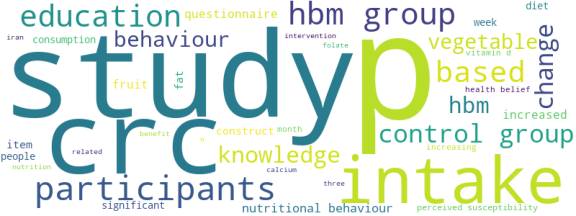| Id | 588 | |
| Author | Hatami T., Noroozi A., Tahmasebi R., Rahba A. | |
| Title | Effect of multimedia education on nutritional behaviour for colorectal cancer prevention: An application of health belief model | |
| Reference | Hatami T., Noroozi A., Tahmasebi R., Rahba A.; Effect of multimedia education on nutritional behaviour for colorectal cancer prevention: An application of health belief model ;Malaysian Journal of Medical Sciences vol:25 issue: 6.0 page:110.0 |
|
| Link to article | https://www.scopus.com/inward/record.uri?eid=2-s2.0-85060138395&doi=10.21315%2fmjms2018.25.6.11&partnerID=40&md5=f8d0a0de8935742b5944d619b21f3ed1 |
|
| Abstract | Background: Colorectal cancer is a major public health problem. A way to decrease this cancer is through dietary behavioural changes. The aim of this study was to determine the effects of education on dietary behaviour based on the health belief model (HBM) using multimedia. Methods: In this clinical trial study, 98 participants were randomly allocated to an HBM group (n = 48) and a control group (n = 50). The HBM group received an audiovisual compact disc (CD) that contained information about nutritional behaviour of colorectal cancer (CRC) prevention based on HBM that lasted 45 min. Both groups completed questionnaires regarding demographic factors, knowledge and HBM constructs, and a three-day dietary recall at the beginning of the study, 1 week after, and 3 months after the education. The outcome of this study was measured by the amount of food servings consumed and dietary micronutrient intake. Results: At the baseline, there were no significant differences between groups regarding demographic factors. Findings showed that self-efficacy (P < 0.001), severity (P < 0.001), and benefits (P < 0.001) were perceived to be higher, and knowledge (P < 0.001) was increased in the HBM group compared to control group 3 months after education. There was a significant increase in fruit and vegetable (P < 0.001) and dairy (P = 0.001) intake and a significant decrease in red meat servings (P = 0.016) in the HBM group compared to the control group. Also, intake of vitamin D (P < 0.001), folate (P < 0.001), calcium (P = 0.008), and dietary fibre (P < 0.001) was increased in the HBM group compared to the control group 3 months after education. Conclusion: Education plans based on HBM and implemented through multimedia can change nutritional beliefs and behaviours for the prevention of colorectal cancer. © 2018, Penerbit Universiti Sains Malaysia. All rights reserved. |
|
| Keywords | Colorectal cancer prevention; Electronic education; Health belief model; Nutritional behaviour |
Wordcloud:



